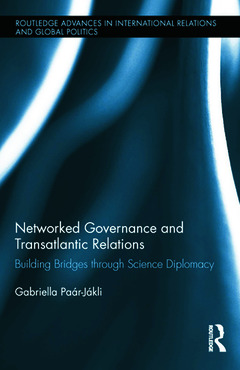Networked Governance and Transatlantic Relations Building Bridges through Science Diplomacy Routledge Advances in International Relations and Global Politics Series
Auteur : Paár-Jákli Gabriella

In today?s complex and interconnected world, scholars of international relations seek to better understand challenges spurred by intensified global communication and interaction. The complex connectedness of modern society and politics compels us to investigate the pattern of interconnections among actors who inhabit social and political spaces.
Gabriella Paár-Jákli's study aims to advance theory and practice by examining the networks used by specialists in North America and Europe to achieve their policy goals in the area of science and technology. Her book suggests that to overcome policy problems transnationally, three critical factors should be considered. First, as science and technology policy becomes increasingly critical to resolving global issues, it should be regarded as an integral element of the foreign policy process. Second, as liberal international relations theory argues, the increasing role of NGOs must be taken seriously alongside states as vital agents of policy reform. Third, as transatlantic relations remain center to maintaining the global order, they must be reconsidered. Paar-Jakli assesses the role of digital networks as facilitators of regional cooperation. Utilizing various techniques of social network analysis, her research indicates an active and structurally discernible network in cyberspace among transatlantic organizations, and demonstrates the role of virtual networks as facilitators of cooperative arrangements in transatlantic relations.
Paár-Jákli's original research uses social network analysis to investigate transatlantic cooperation, a new approach that will be noteworthy to network and transatlantic scholars as well as policymakers.
1. Introduction. 2. Synthesizing Theories: International Communication, Cooperation, Networks and Governance. 3. All Is Well in Transatlantic Relations? 4. Why Science and Technology Policy? 5. Who are the movers and shakers in transatlantic relations? 6. Conclusion. Appendix A: Research Appendix - Methodology. Appendix B: Transatlantic Connections – KNETs. Appendix C: Transatlantic Connections by Types of Organization. Appendix D: Transatlantic Connections by Types of Organization. Appendix E: Additional Key Findings based on Network Attributes.
Date de parution : 05-2014
15.6x23.4 cm
Date de parution : 04-2016
15.2x22.9 cm
Thème de Networked Governance and Transatlantic Relations :
Mots-clés :
international relations; Gabriella Paar-Jakli; global communication; transatlantic networks; transatlantic relations; international relations theory; NGOs; social network analysis; network governance; institutional actors; Hyperlink Network Analysis; National Defense Research Committee; OSTP; Transatlantic Organizations; Structural Holes; National Academy; Liberal IR Theory; Transatlantic Agenda; Civil Society; Transatlantic Partnership; Internet Governance; Transatlantic Legislators; Hyperlinking Practices; Embedded Case Study; TEPS; EU’s Perspective; Backbone Agencies; Good Hubs; EU Policy Maker; EU Practice; European Commission External Relations; Spectral Clustering



